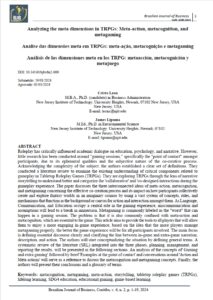Meta dimensions: Publication in the Brazilian Journal of Business
I am thrilled to share our latest publication in the esteemed Brazilian Journal of Business. The paper «Analyzing the Meta Dimensions in TRPGs: Meta-Action, Metacognition, and Metagaming» collaborates with distinguished colleague Dr. James Lipuma. It’s an honor to be a part of this paper (Leon & Lipuma, 2024).
Paper Abstract:
Roleplay has critically influenced academic dialogue on education, psychology, and narrative. However, little research has been conducted around «gaming sessions,» specifically the «point of contact» amongst participants, due to its ephemeral qualities and the subjective nature of the co-creative process. Acknowledging the complexity of the subject, the authors established a clear set of definitions. They conducted a literature review to examine the existing understanding of critical components related to gameplay in Tabletop Roleplay Games (TRPGs). They are exploring TRPGs through the lens of narrative storytelling to understand better and categorize the ‘collaborative’ and ‘co-designed interactions during the gameplay experience. The paper discusses the three interconnected ideas of meta-action, metacognition, and metagaming concerning the effective co-creation process and its impact on how participants collectively create and explore fantasy worlds in an imaginary cosmos by using a vast system of concepts, rules, and mechanisms that function as the background or canvas for action and interaction amongst them. As Language, Communication, and Education occupy a central role in the gaming experience, miscommunication and assumptions will lead to a break in immersion. Metagaming is commonly labeled as the «worst» that can happen in a gaming session. The problem is that it is also commonly confused with meta-action and metacognition, which are essential to the game. This article aims to provide the tools to all players that will allow them to enjoy a more engaging in-game experience, based on the idea that the more players manage metagaming properly, the better the game experience will be for all participants involved. The main focus is defining essential discourse clearly and clarifying the line between in-game and extra-game narration, description, and action. The authors will start conceptualizing the situation by defining general terms. A systematic review of the literature (SRL) integrated into the three phases, planning, management, and reporting the results, will be presented in the following sections. An analysis of the concepts of’ Gaming and extra gaming’ followed by brief ‘Examples at the point of contact’ and conversations around ‘Action and Meta-actions’ will serve as a reference to discuss the metacognition and metagaming concepts. Finally, the authors will present their conclusions and a glossary of terms.
Keywords:
Metacognition, Metagaming, Meta-action, Storytelling, Tabletop Roleplay Games (TRPGs), Lifelong Learning, SDG4 Education, Educational Gaming, Game-Based Learning.
Presented at:
5to Coloquio Internacional de Estudios sobre Juegos de Rol (Yáñez León & Lipuma, 2021)
Read Our Paper
You can access our paper in the Brazilian Journal of Business, Vol. 6, No. 2, pp. 1-19], 2024. Read here
Acknowledgments
The authors would like to thank Cynthia Shafer and Sandy Chang for their unconditional support.
As we as to Diego Téllez Bueno, Esteban Martínez Rojo, José Ernesto Malpica Rosendo, and Oscar Toriz Nava, thank you for your dedicated support as a consultant for this article.
Finally, we would like to express our gratitude to the Red de Investigadores de Juegos de Rol, for encouraging these conversations.
Disclosure statement
No conflict of interest pertains to the research presented above.
ORCID
Cristo Leon https://orcid.org/0000-0002-0930-0179
James Lipuma https://orcid.org/0000-0002-9778-3843
Copyright
All rights reserved © 2023 Brazilian Journals Publicações de Periódicos e Editora Ltda.
Sources
Leon, C., & Lipuma, J. (2024). Analyzing the Meta Dimensions in TRPGs: Meta-Action, Metacognition, and Metagaming [BJB]. Brazilian Journal of Business, 6(2), 1–19. /Research/Cultural and Social Studies. https://doi.org/10.34140/bjbv6n2-009
Yáñez León, C. E., & Lipuma, J. (2021). AAnalyzing the Meta Dimensions in TRPGs: Meta-Action, Metacognition, and Metagaming [Artículo en conferencia]. El papel del rol para el fomento de la cultura y la lectura, 5. /Research/Cultural and Social Studies. https://digitalcommons.njit.edu/stemresources/13/
Citation
When citing this paper, use this format:
Leon, C., & Lipuma, J. (2024). Analyzing the Meta Dimensions in TRPGs: Meta-Action, Metacognition, and Metagaming [BJB]. Brazilian Journal of Business, 6(2), 1–19. /Research/Cultural and Social Studies. https://doi.org/10.34140/bjbv6n2-009

